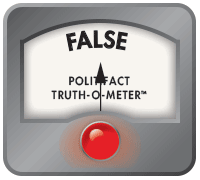Illinois’ flat income tax, currently set at a rate of 4.95 percent for all individual taxpayers, is an outlier. The federal government, as well as most states that have an income tax, feature what is commonly referred to as a progressive tax system in which higher earners pay higher rates.
Democrat J.B. Pritzker, the challenger to Republican Gov. Bruce Rauner in the November election, says he wants to switch Illinois to a progressive tax, though he has been vague about details.
Rauner’s running mate, Lt. Gov. Evelyn Sanguinetti, recently ripped into Pritzker’s tax plan during an interview on a Fox News-affiliated talk radio station that serves the Illinois suburbs of St. Louis.
Pritzker will “stick you with that progressive income tax which is surely to be an increase — not to mention the fact that it is wholly regressive,” Sanguinetti told Marc Cox of KFTK.
That is quite the oxymoron. Can a progressive income tax actually be regressive? We decided to check.
Define ‘regressive’
The Illinois Constitution mandates a flat-rate income tax, and any move to try to change that would have to overcome difficult procedural hurdles in the state Legislature as well as sharp ideological and political disputes. Republicans, Rauner among them, contend that taxing income at graduated levels would inevitably lead to an unfair and unnecessary tax increase in sheep’s clothing.
Democrats, meanwhile, insist the change is critical to easing the burden on lower-income taxpayers and raising revenue to fund key services such as public education.
Pritzker backs a constitutional amendment to allow for a progressive tax. As a stopgap until that could be accomplished, however, the Democrat says he wants to raise the current flat tax rate — he hasn’t specified how much — but would make it “artificially progressive” by offsetting the increased cost for the non-affluent with enhanced tax credits.
That’s where Sanguinetti’s up-is-down critique comes in. We asked a spokesman for the Rauner/Sanguinetti campaign to explain what she meant. He took a pass on explaining her thesis that “progressive” means “regressive,” but it seems unlikely it was a slip-of-the-tongue because the campaign promoted audio and a transcript of the interview on its website.
No less an authority than the Internal Revenue Service says a regressive tax pretty much means what it sounds like, too. The IRS defines it as a tax that “takes a larger percentage of income from low-income groups than from high-income groups.”
The spokesman, Justin Giorgio, did however weigh in on Sanguinetti’s contention that taxes would rise. “Lt. Governor Sanguinetti was simply saying that if J.B. Pritzker has his way, more Illinoisans will be paying higher taxes,” Giorgio said in an email, referencing Pritzker’s constitutional workaround plan.
Last December, we rated as Mostly False a similar claim from Rauner that calls for a progressive tax from Pritzker and his then rivals in the Democratic primary for governor were tantamount to advocating a “massive income tax hike.”
That fact check noted that a Pritzker spokesman had specifically ruled out anything that would raise taxes on middle-class families. It also highlighted how several states with graduated taxes had set rates for middle- and low-income earners below the flat tax rate Illinois now charges.
As for Sanguinetti’s progressive-is-regressive scenario, economist J. Fred Giertz with the Institute of Government and Public Affairs at the University of Illinois told us a plan such as Pritzker’s wouldn’t qualify as regressive.
“If lower income people pay a lower rate than higher income people, that by definition is a progressive rate,” Giertz said. “The only way a regressive rate exists is if low-income people pay … a higher rate of tax.”
For the record, Giertz says Illinois’ current flat-tax system isn’t regressive either and could even be considered slightly progressive because it already includes some tax credits for low-income earners that enable them to pay a lower effective tax rate than those of higher income.
Our ruling
Sanguinetti said in a recent radio interview that Pritzker’s plan for a “progressive income tax” is “wholly regressive.”
A spokesman declined to explain what she meant by that. But the federal definition for a regressive tax makes her statement read like something straight out of Opposite Day.
According to both the IRS and an Illinois economics expert, a regressive tax is one that takes a greater share of income from those who earn less than from those who earn more. A progressive tax, on the other hand, is one that requires higher earners to pay a higher rate than their lower earning counterparts.
We rated as Mostly False Rauner’s earlier claim about an inevitable “massive” tax hike if a progressive tax system was implemented in Illinois. Sanguinetti takes that even further with her rhetorical head-scratcher, which is why we rate her claim False.
The Better Government Association runs PolitiFact Illinois, the local arm of the nationally renowned, Pulitzer Prize-winning fact-checking enterprise that rates the truthfulness of statements made by governmental leaders and politicians. To read more, go to bettergov.org/type/politifact.
SOURCES
Chart:State individual income tax rates, Federation of Tax Administrators, accessed June 28, 2018
“Illinois Lt Governor Evelyn Sanguinetti: J. B. Pritzker part of pay-to-play,” FM NewsTalk 97.1, June 26, 2018
“Pritzker: Raise state tax rate, boost exemptions while working on a graduated income tax,” Chicago Tribune, April 3, 2018
Email interview: Justin Giorgio, Rauner campaign spokesman, June 27, 2018
Campaign post, Bruce Rauner’s campaign website, accessed June 26, 2018
“Rauner distorts Dems’ message on Illinois income tax,” PolitiFact Illinois, December 14, 2017
Phone interview: J. Fred Giertz, economist at the University of Illinois, June 27, 2018
Tax definitions, Internal Revenue Service, accessed June 28, 2018









